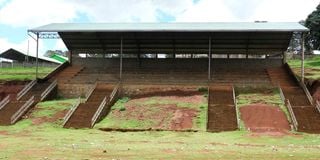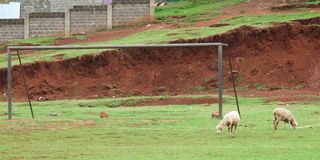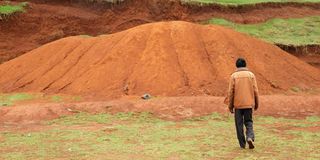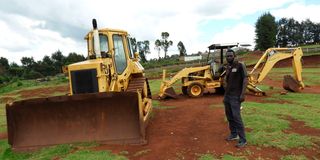Premium
Olenguruone Stadium: Construction work started in 2012, stalled in 2017

The main pavilion at Olenguruone stadium in Kuresoi South, Nakuru county whose construction has stalled for the last six years in this photo taken on April 04, 2023.
What you need to know:
- Heaps of soil excavated from the field have been dumped on one end of the stadium, a few metres from the goal post, sticking out like sand dunes in a desert
- Construction of the main pavilion is incomplete, and like at the fence, water keeps eroding the soil it lies on exposing the structure to possible collapse
- Former Auditor General Edward Ouko revealed in a report covering the 2017/2018 financial year that the contractor left the site before September 2016, when an inspection was done at the facility
Construction of Olenguruone Stadium, situated in Kuresoi South, Nakuru County, started 11 years ago.
But five years later, in 2017, with little to show for on the ground, the contractor abandoned the site because of lack of adequate funds.
A case was also filed in court by a private developer claiming part of the land that the stadium under construction was lying on.
When Nation Sport toured the site last Tuesday, there was no activity. Heaps of soil excavated from the field have been dumped on one end of the stadium, a few metres from the goal post, sticking out like sand dunes in a desert.
Two earth movers, rusty and broken down, lie abandoned at the site.
A perimeter wall is incomplete, and anybody can walk in and out unhindered.
Construction of the main pavilion is incomplete, and like at the fence, water keeps eroding the soil it lies on exposing the structure to possible collapse.
In fact, as a result of soil erosion, some sections of the perimeter wall have tumbled down. Needless to say, the field is a grazing ground much preferred by goat herders.

Sheep grazing by a goal post standing near an excavated wall that has seriously been eroded by storm water depositing soil at Olenguruone stadium's football pitch and athletics track in this photo taken on April 04, 2023.
Twin Contractors was given the contract to build the stadium at a cost of Sh290,643,668 million in November, 2012 according to the Auditor General with the delivery of the project in 104 weeks.
Former Auditor General Edward Ouko revealed in a report covering the 2017/2018 financial year that the contractor left the site before September 2016, when an inspection was done at the facility. Some Sh73 million had been paid to the contractor.
The national government signed the contract according to former Principal Secretary for Housing and Urban Planning Development Charles Hinga.
Hinga made the revelation when he appeared before the Public Accounts Committee (PAC) at the National Assembly chaired by Opiyo Wandayi in August 2019 to answer questions on why the development at the stadium had stalled.

A man walks near a heap of soil excavated and dumped at a corner at Olenguruone stadium in Kuresoi South constituency, Nakuru county in this photo taken on April 04, 2023.
Robert Langat, the Amalo Ward Member of County Assembly where the stadium is situated, said that the stalled construction of Olenguruone Stadium, the only one in Kuresoi South and Kuresoi North sub counties, had hampered efforts by various stakeholders to promote sports in the area.
“Kuresoi South and North region is teeming with athletics talent. Many trailblazers from the region in the various sports disciplines having trained in sub-standard facilities, but managed to stand out regionally, nationally and internationally,” Langat stated.
Some of the more famous athletes who trace their roots to Kuresoi are Jackline Chepkoech, the 2022 Commonwealth Games 3,000m steeplechase gold medallist, Geofrey Kirui the 2017 World Marathon champion, and Richard Mateelong, the 2008 Olympic Games 3,000m steeplechase bronze medallist.
William Ochieng, the FKF Kuresoi South sub branch chairman said there was need for the government to pay the contractor so that the construction work could restart.

A man stands by two abandoned earth movers at Olenguruone stadium in Kuresoi South constituency, Nakuru county whose construction has stalled for the last six years for lack of funds, in this photo taken on April 04, 2023.
“For the last six years, the football teams that use the stadium have had to bear with the poor state of the pitch which, due to lack of drainage, becomes unplayable during the rainy season,” Ochieng said.
Ali Onyango, an Umoja FC official said in an interview that storm water from Olenguruone trading centre washes down raw sewerage and debris to the stadium which sits on lower ground, worsening the stare of the pitch. Some of the football clubs that use the stadium despite its pathetic state are Umoja Kaplamai, Kimugul, Mau, Kiptarakon, Keringet and Kiplelchi.
“This is a high altitude area that is conducive for training by athletes taking part in various disciplines, but failure by the finishing the stadium has negatively impacted on the youth,” said Mike Kiplangat Bett, a local resident.





